RITC on credit notes, gifts,freedistribution,goods lost, destroyed or ...
RITC on credit notes, gifts,freedistribution,goods lost, destroyed or ...
RITC on credit notes, gifts,freedistribution,goods lost, destroyed or ...
Create successful ePaper yourself
Turn your PDF publications into a flip-book with our unique Google optimized e-Paper software.
NATIONAL TAX NEWS AND VIEWSNTNA FORTNIGHTLY VAT/GST LAW REPORTERFirst Journal in Uttar Pradesh and Uttarakhand Providing<strong>on</strong>line Serviceswww.ntn<strong>on</strong>line.net <strong>or</strong> www.upvat<strong>on</strong>line.complanning seller should refrain from the situati<strong>on</strong> of issuing <strong>credit</strong> note, by notfalling within the ambit of secti<strong>on</strong> 21(14).Rule 21(1)(af) denies the benefit of ITC with respect to the <strong>goods</strong> which aregifted, <strong>or</strong> otherwise distributed free of cost <strong>or</strong> <strong>lost</strong>, <strong>destroyed</strong> <strong>or</strong> stolen. Secti<strong>on</strong>3 of the VAT Act is the charging secti<strong>on</strong> which levies the tax <strong>on</strong> taxableturnover of sale. Sale is defined in secti<strong>on</strong> 2(ac) of the Act as transfer ofproperty in <strong>goods</strong> f<strong>or</strong> cash, deferred payment <strong>or</strong> f<strong>or</strong> any other valuablec<strong>on</strong>siderati<strong>on</strong>. The expressi<strong>on</strong> valuable c<strong>on</strong>siderati<strong>on</strong> has been explained bythe Apex Court in the case of Devi Das Gopal Krishna Vs. State of Punjab,rep<strong>or</strong>ted in Vol. 20 STC page 430 as the expressi<strong>on</strong> ‘valuable c<strong>on</strong>siderati<strong>on</strong>’takes colour from the preceding expressi<strong>on</strong> “cash <strong>or</strong> deferred payment”. If so, itcan <strong>on</strong>ly mean some other m<strong>on</strong>etary payment in the nature of cash <strong>or</strong>deferred payment. The Divisi<strong>on</strong> Bench of Allahabad High Court in the case ofSales Tax Commissi<strong>on</strong>er vs. Ram Kumar Agrawal, rep<strong>or</strong>ted in Vol. 19 STCpage 400, has held that the w<strong>or</strong>ds other valuable c<strong>on</strong>siderati<strong>on</strong> at best can beinterpreted <strong>on</strong> the basis of rule of ejusdem generis to mean payment i.e. bycheque, bills of exchange <strong>or</strong> any other negotiable instrument, but they cannotpossibly cover a case where no price is paid.ITC under secti<strong>on</strong> 13 is available <strong>on</strong> resale <strong>or</strong> sale after manufacture of <strong>goods</strong>,which event canot happen in the case of making of <strong>gifts</strong>, free distributi<strong>on</strong> <strong>or</strong>the <strong>goods</strong> getting <strong>lost</strong>, <strong>destroyed</strong> <strong>or</strong> stolen. But in the eventualitiesc<strong>on</strong>templated under rule 21(1)(af) no valuable c<strong>on</strong>siderati<strong>on</strong> is involved, henceit is not a sale as per secti<strong>on</strong> 2(ac). Thus, benefit of ITC is not available undersecti<strong>on</strong> 13 of the Act. Hence, when ITC cannot be claimed under the Act/Rule,and it is not claimed as such, by the dealer, <strong>on</strong> the happening of the af<strong>or</strong>esaideventualities, there is no questi<strong>on</strong> of any <str<strong>on</strong>g>RITC</str<strong>on</strong>g>. But if dealer has wr<strong>on</strong>glyclaimed the ITC , then <str<strong>on</strong>g>RITC</str<strong>on</strong>g> is bound to happen under secti<strong>on</strong> 14(2) of the Act.Tax which has been paid earlier <strong>on</strong> the happening of a taxable event, withrespect to the <strong>goods</strong> which have been subsequently stolen/<strong>lost</strong>/<strong>destroyed</strong>, itsITC would be available <strong>on</strong>ly when those <strong>goods</strong> are sold to remove the cascadingeffect of tax, which would be impossible. If ITC is allowed <strong>on</strong> the <strong>goods</strong> whichare subsequently gifted, stolen, <strong>lost</strong> <strong>or</strong> <strong>destroyed</strong>, then it would amount togiving refund of tax f<strong>or</strong> the earlier c<strong>on</strong>cluded transacti<strong>on</strong>, wherein the taxableevent has already occurred. Under the eventualities c<strong>on</strong>templated under rule21(1)(af) the same <strong>goods</strong> cannot again be sold. Hence, there is no questi<strong>on</strong> ofremoving the cascading effect of tax, and hence ITC is not admissible to thedealer, which if he had claimed err<strong>on</strong>eously is bound to be reversed. Further asper rule 21(1)(l) benefit of ITC is not available when sale of <strong>goods</strong> is not liable totax in the hands of the purchaser, <strong>on</strong> the similar analogy that when there is nosubsequent tax liability, benefit of set off of ITC to remove the cascading effectof tax cannot be given.---------------------------------------©: Nati<strong>on</strong>al Law Book Publicati<strong>on</strong>s, B-2, Modern Plaza BuildingAmbedkar Road, Ghaziabad -201001-U.P. Ph<strong>on</strong>e Nos. (0120) 4128197,2793852,Email : nlh_ntn@rediffmail.com <strong>or</strong> ntnalerts@gmail.com


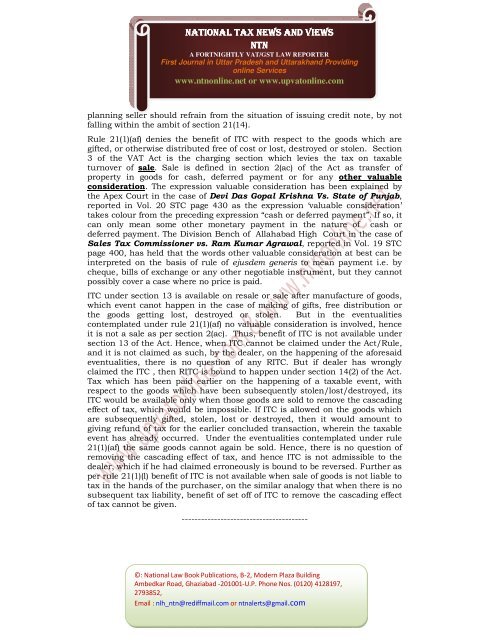
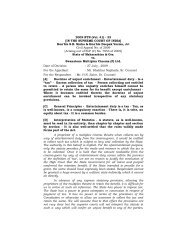
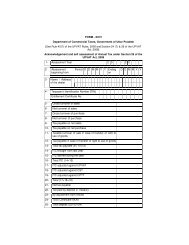
![2008 NTN (Vol. 36) - 107 [ALLAHABAD HIGH COURT] Hon'ble ...](https://img.yumpu.com/50102532/1/190x245/2008-ntn-vol-36-107-allahabad-high-court-honble-.jpg?quality=85)
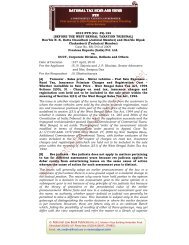
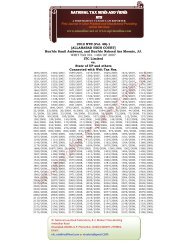
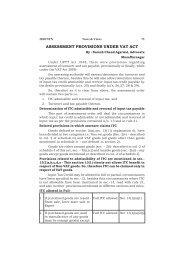

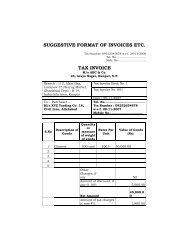
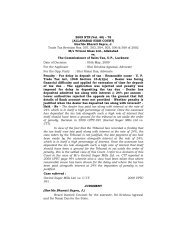

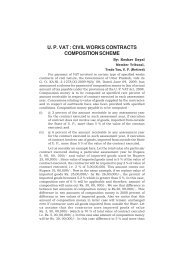
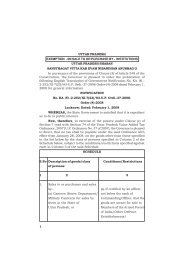
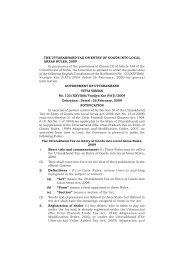
![2010 NTN (Vol. 43) - 306 [ALLAHABAD HIGH COURT] Hon'ble ...](https://img.yumpu.com/35159282/1/190x245/2010-ntn-vol-43-306-allahabad-high-court-honble-.jpg?quality=85)